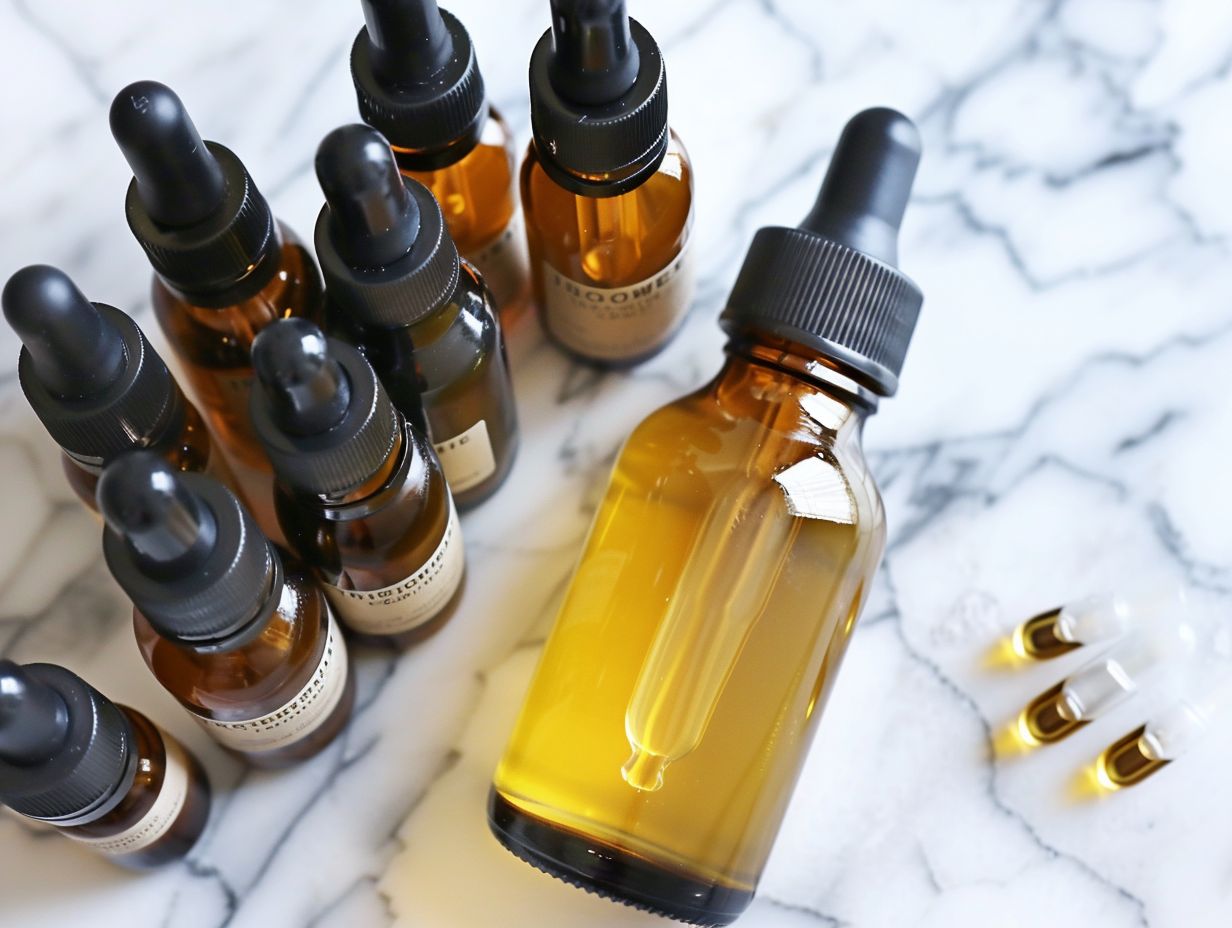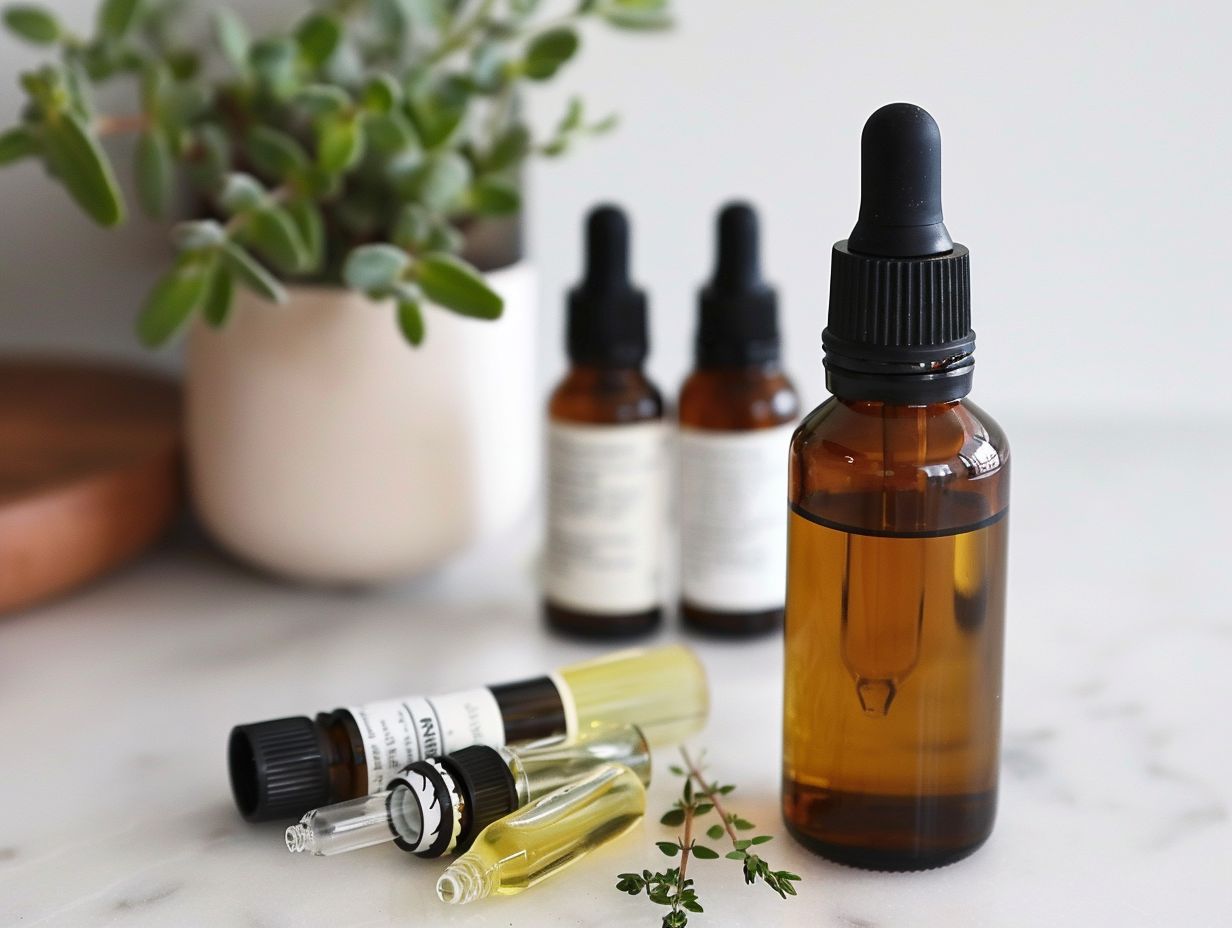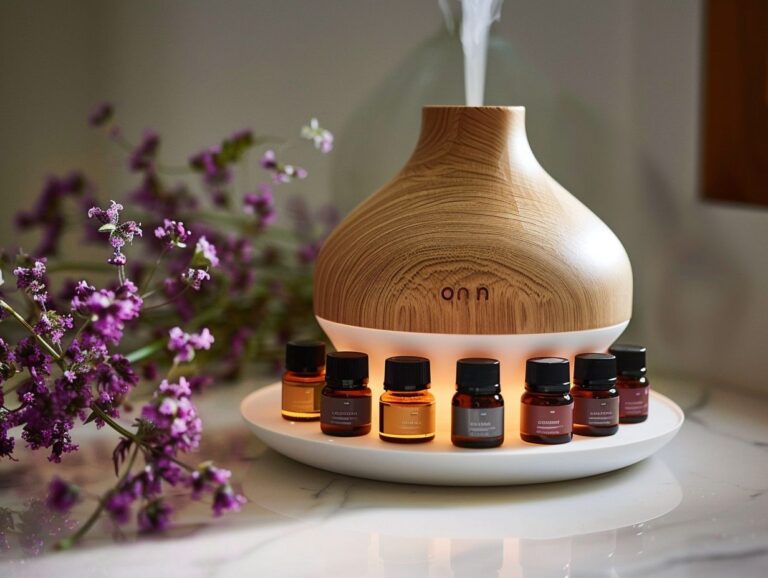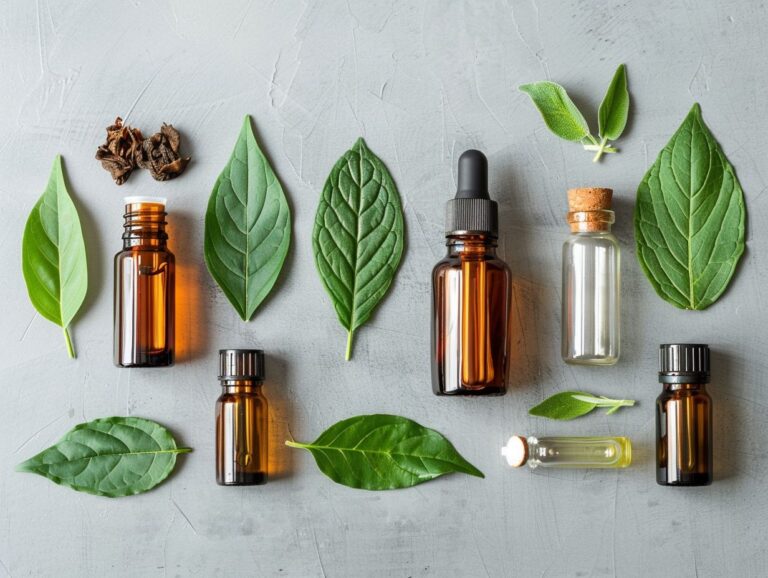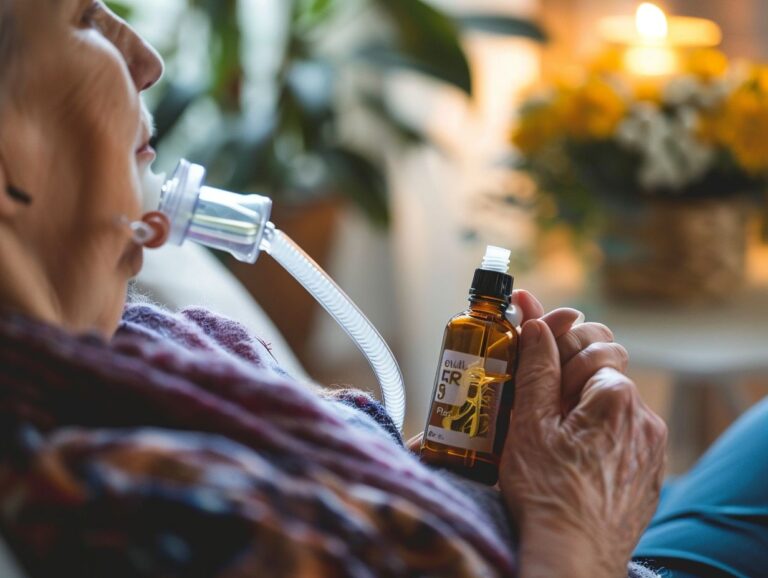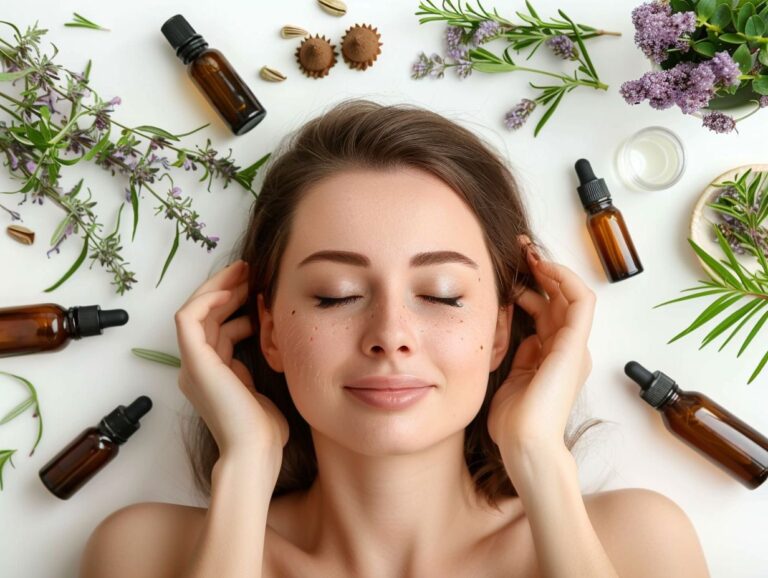Can You Add Essential Oils to Jojoba Oil
Curious about the benefits of essential oils and how they can be mixed with jojoba oil? Look no further!
In this article, we explore the world of jojoba oil and essential oils, discussing the advantages of combining them.
From skincare to haircare, aromatherapy to massage, we delve into the uses and blending techniques of these oils. Let’s find out together if you can add essential oils to jojoba oil!
Key Takeaways:
What Is Jojoba Oil?
Jojoba oil is a popular carrier oil known for its exceptional moisturizing properties and its similarity to the skin’s natural oils. Extracted from the seeds of the jojoba plant, this versatile oil is prized in skincare for its nourishing and hydrating effects.
Originating from the Southwest region of North America, the indigenous communities like the Native Americans have long utilized jojoba oil for its healing properties. Its resemblance to the skin’s sebum allows it to penetrate deeply into the skin without leaving a greasy residue. This makes it ideal for all skin types, including oily and acne-prone skin. Due to its stability, jojoba oil acts as an effective carrier oil, enhancing the absorption of other essential oils when blended together.
What Are Essential Oils?
Essential oils are concentrated plant extracts that capture the essence, fragrance, and therapeutic properties of plants. These aromatic oils are commonly used in skincare, aromatherapy, and massage due to their pleasing scents and diverse benefits.
With a wide range of scents, essential oils offer not only a delightful olfactory experience but also various skin-enhancing properties. For instance, lavender oil is renowned for its soothing and calming effects, making it ideal for reducing stress and promoting relaxation. On the other hand, tea tree oil is a potent antibacterial agent that can help combat acne and blemishes. When blended carefully, these oils can address specific skin concerns and elevate the overall effectiveness of skincare routines.
What Are the Benefits of Essential Oils?
Essential oils offer a range of benefits for skin care and overall health. These natural ingredients can help improve skin texture, promote relaxation, and even alleviate certain health conditions. It’s essential to be aware of potential reactions and sensitivities, especially when using them undiluted.”
One of the key advantages of essential oils lies in their ability to target specific skin concerns. Whether it’s managing oily skin, reducing acne breakouts, or soothing irritation, these potent oils can be tailored to individual needs. Their aromatherapy benefits contribute to mental well-being, reducing stress and anxiety. It’s crucial to emphasize the importance of proper dilution to prevent adverse reactions, as concentrated oils can be potent and may irritate the skin. Careful research and consultation with a skincare professional can help determine the best oils and concentrations for personalized skincare routines.
Can You Mix Essential Oils with Jojoba Oil?
Mixing essential oils with jojoba oil is a common practice in aromatherapy and skincare. Jojoba oil serves as an excellent carrier oil that can help dilute the potent nature of essential oils, making them safe for direct application to the skin.
When blending essential oils with jojoba oil, it is crucial to pay attention to the proportions. Generally, a 2-3% dilution is recommended for most applications. This means using around 12-18 drops of essential oil per ounce of jojoba oil. The consistency and absorbency of jojoba oil make it a versatile base for various DIY skincare products like serums, lotions, and creams.
Jojoba oil is rich in nutrients and has anti-inflammatory properties, enhancing the overall benefits of the essential oils when used together. Its similarity to the skin’s natural oils also makes it well-tolerated by most skin types, reducing the risk of irritation or sensitivity.
What Are the Benefits of Mixing Essential Oils with Jojoba Oil?
Mixing essential oils with jojoba oil offers a range of benefits for the skin. The combination provides deep hydration, nourishment, and can enhance the absorption of essential oil properties into the skin, promoting overall skin health.
Jojoba oil, often referred to as a ‘miracle oil,’ serves as an ideal carrier oil due to its similarities to the natural oils produced by our skin, making it highly compatible and non-comedogenic.
When combined with essential oils known for their aromatic and therapeutic properties, jojoba oil acts as a medium that not only dilutes the concentrated essential oils but also facilitates their smooth application on the skin.
This blend creates a balanced formula that not only locks in moisture but also caters to specific skin concerns due to the variety of essential oils available, catering to various skin types and needs.
Are There Any Risks or Side Effects of Mixing Essential Oils with Jojoba Oil?
While mixing essential oils with jojoba oil is generally safe, there are potential risks to consider. Some individuals may experience skin reactions or irritation, especially if using certain essential oils in high concentrations or if they have sensitivities to specific compounds.
It’s vital to be aware of these potential risks when blending essential oils with jojoba oil. Skin sensitivities can vary from person to person, and what works well for one individual may trigger adverse reactions in another. Conducting a patch test before full application is crucial to assess any potential negative responses. Patch tests involve applying a small amount of the diluted oil mixture to a small area of skin, typically on the forearm, and monitoring for any adverse reactions over 24 hours.
What Essential Oils Can Be Mixed with Jojoba Oil?
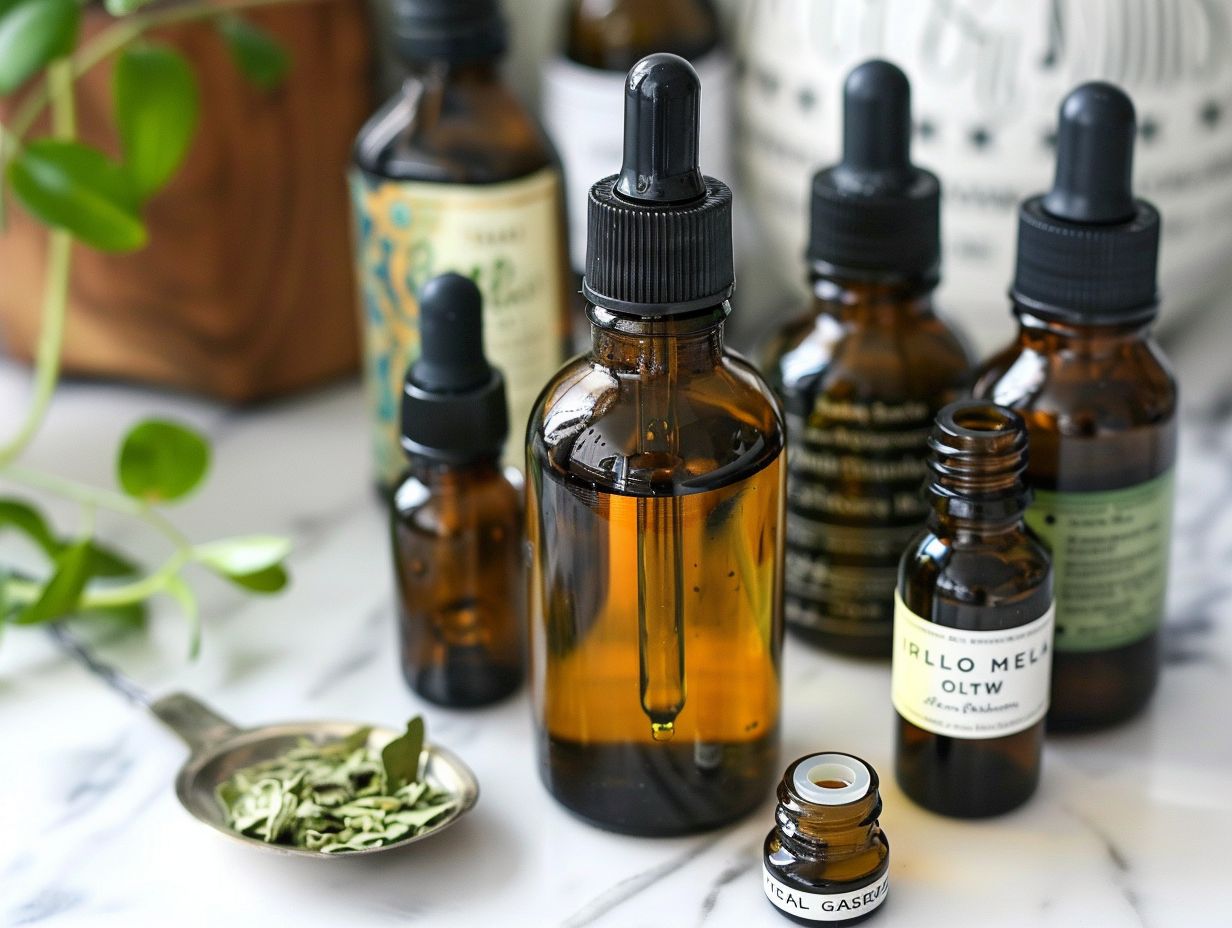
When paired with jojoba oil, lavender essential oil adds a calming and floral scent, perfect for relaxation and promoting better sleep.
Tea tree oil is known for its antibacterial properties, making it a great addition for skincare blends.
Peppermint oil provides a refreshing and invigorating aroma, ideal for enhancing focus and relieving headaches.
Rosemary oil has a herbaceous fragrance, beneficial for improving memory and mental clarity.
Finally, eucalyptus oil offers a fresh and cleansing scent, useful for respiratory support and combating congestion.
Lavender Essential Oil
Lavender essential oil is a versatile oil known for its calming effects on the skin and mind. When mixed with jojoba oil, it can promote relaxation, improve skin texture, and impart a soothing aroma.
One of the key benefits of combining these two oils is their ability to create a potent blend that not only nourishes the skin but also helps in reducing stress and anxiety levels. Lavender essential oil is renowned for its calming properties, making it an ideal choice for unwinding after a long day. Its antiseptic and anti-inflammatory characteristics can also aid in treating minor skin irritations and blemishes.
On the other hand, jojoba oil works wonders in moisturizing and balancing the skin’s natural oils, resulting in a smoother, more radiant complexion. When these two oils are combined, the jojoba oil acts as a carrier, ensuring that the lavender essential oil penetrates deep into the skin, maximizing its therapeutic effects.
The delightful floral scent of lavender essential oil combined with the subtle nutty aroma of jojoba oil creates a harmonious blend that not only benefits the skin but also uplifts the senses, making it a perfect choice for self-care routines and relaxation rituals.
Tea Tree Essential Oil
Tea tree essential oil is renowned for its antimicrobial properties, making it a popular choice for acne-prone skin.
When combined with jojoba oil, this potent duo creates a powerhouse blend that not only targets existing acne but also helps prevent future breakouts. The antimicrobial properties of tea tree oil work to combat acne-causing bacteria on the skin’s surface, while the soothing and moisturizing properties of jojoba oil help balance oil production and nourish the skin.
Tea tree oil’s natural astringent properties can also help tighten pores, reducing their appearance and giving the skin a more refined look. This makes it an excellent addition to skincare routines for those dealing with acne-prone or oily skin.
Peppermint Essential Oil
Peppermint essential oil offers a refreshing and cooling sensation when mixed with jojoba oil, making it an excellent choice for massage blends. The invigorating aroma of peppermint can uplift the senses and promote relaxation.
When applied during a massage, the cooling effect of peppermint oil combined with the nourishing properties of jojoba oil creates a harmonious balance that not only rejuvenates the body but also calms the mind. This dynamic duo not only provides physical relief but also stimulates the senses, offering a multi-sensory experience that enhances the overall therapeutic benefits of the massage session. The aromatic properties of peppermint essential oil play a significant role in creating a tranquil environment conducive to deep relaxation.
Rosemary Essential Oil
Rosemary essential oil is beneficial for haircare when combined with jojoba oil. It can help nourish the scalp, promote hair growth, and improve overall hair health with its stimulating properties.
When used on the scalp, rosemary essential oil has been found to increase blood circulation, encouraging hair follicles to produce stronger and healthier strands. Its antimicrobial properties also help maintain a clean and healthy scalp, reducing the chances of dandruff or other scalp conditions.
Combining rosemary essential oil with jojoba oil creates a potent blend that not only moisturizes and conditions the hair but also provides a protective barrier against environmental damage, such as UV rays and pollutants, that can cause hair to become weak and brittle.
Eucalyptus Essential Oil
Eucalyptus essential oil, when mixed with jojoba oil, offers respiratory benefits and can help alleviate congestion. Its invigorating scent makes it a popular choice for aromatherapy blends aimed at promoting clear breathing and relaxation.
Decongestant properties of eucalyptus oil can provide relief from sinus congestion and respiratory discomfort by clearing the airways. When combined with jojoba oil, the oil’s anti-inflammatory and antimicrobial properties enhance its effectiveness in combating respiratory issues.
The aromatherapy uses of this blend are vast, as inhaling the soothing aroma can calm the mind, reduce stress, and promote a sense of well-being. The refreshing fragrance can also help improve focus and mental clarity.
How to Mix Essential Oils with Jojoba Oil?
When mixing essential oils with jojoba oil, it’s crucial to consider the dilution ratio and employ proper blending techniques to ensure a well-mixed and safe final product. Diluting essential oils with jojoba oil helps reduce the risk of skin irritation and sensitivities.
One recommended dilution ratio is to start with a concentration of 2% essential oil to jojoba oil for general use. This translates to about 12 drops of essential oil per ounce of carrier oil.
Blending methods such as gentle stirring or rolling the bottle between your hands can help evenly distribute the oils without causing them to degrade.
Considering safety precautions, always perform a patch test on a small area of skin before applying the blend liberally to ensure there are no adverse reactions.
Dilution Ratio
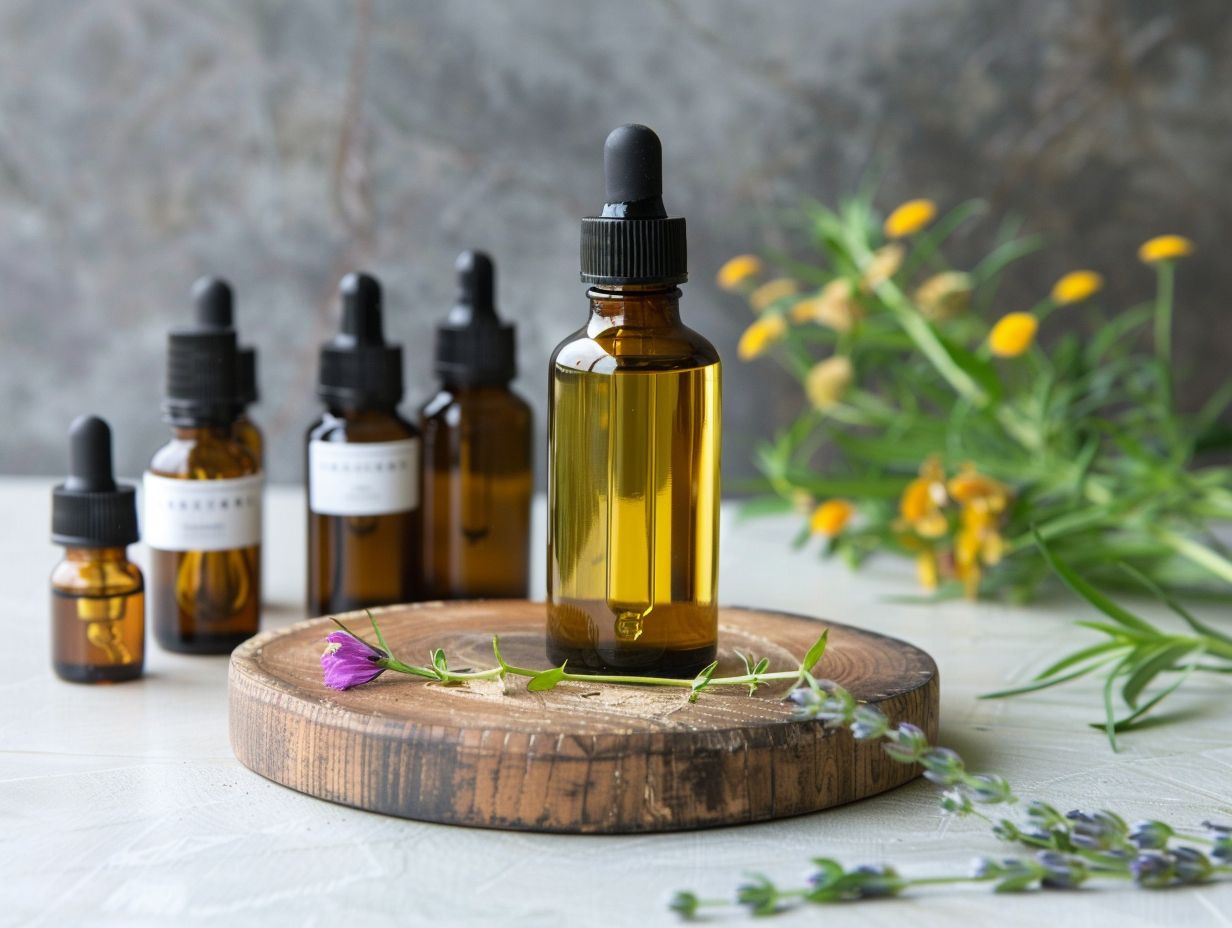
The dilution ratio when mixing essential oils with jojoba oil is crucial for ensuring the safety and efficacy of the final blend. It’s recommended to start with a low concentration of essential oil and gradually increase based on skin tolerance.
Safe dilution ratios play a key role in preventing adverse skin reactions and maximizing the benefits of essential oils. Proper concentration levels not only ensure effectiveness but also minimize the risk of sensitivity issues. By following guidelines for safe dilution, individuals can customize their blends to suit their skin’s unique needs. It’s important to be mindful of the skin tolerance levels of different essential oils and adjust the dilution accordingly. While experimentation is encouraged, caution and gradual adjustments are paramount in achieving a harmonious and safe blend.
Blending Techniques
Effective blending techniques are essential when combining essential oils with jojoba oil to ensure a homogeneous mixture with consistent viscosity.
Emulsion blending is another method that involves using a blender or handheld mixer to thoroughly combine the oils and create a stable emulsion. This technique is particularly useful for achieving a smooth and uniform blend.
Additionally, heat-assisted blending can be employed by gently heating the jojoba oil before adding the essential oils to enhance the overall consistency and aid in the blending process. Carefully monitoring the temperature during this method is crucial to prevent any degradation of the beneficial properties of the oils.
What Are the Uses of Essential Oils Mixed with Jojoba Oil?
Essential oils mixed with jojoba oil have diverse applications in skincare, haircare, aromatherapy, and massage therapy. These blends can be customized to address specific skin concerns, promote relaxation, and enhance overall well-being.
Regarding skincare, jojoba oil acts as an excellent carrier oil for essential oils, helping to nourish and hydrate the skin. Essential oils like lavender, tea tree, or frankincense can be added to jojoba oil to target acne, dryness, or signs of aging effectively.
In hair treatments, the mixture of essential oils with jojoba oil can promote hair growth, add shine, and address scalp issues.
In aromatherapy, combining essential oils with jojoba oil in a diffuser can create a calming or invigorating ambiance, depending on the chosen oils.
For massage therapies, blending essential oils with jojoba oil enhances the therapeutic benefits by reducing muscle tension and improving circulation.
Skincare
When used in skincare, essential oils mixed with jojoba oil can offer natural solutions for various skin concerns. Homemade blends incorporating citrus oils, such as bergamot, lemon, and lime, can provide refreshing and revitalizing effects on the skin.
These homemade blends not only help in hydrating and nourishing the skin but also possess antimicrobial properties that can aid in combating acne and breakouts.
Citrus oils are known for their brightening effects, promoting a more even skin tone and reducing the appearance of dark spots. Their uplifting aromas can also have mood-boosting effects, making your skincare routine a sensory delight.
Haircare
Essential oils combined with jojoba oil can transform haircare routines by providing nourishment, hydration, and promoting hair health. Incorporating carrier oils like sweet almond oil in these blends enhances their conditioning and strengthening properties.
Carrier oils play a vital role in haircare due to their unique ability to enhance the benefits of essential oils. Sweet almond oil, for instance, is rich in vitamin E, essential fatty acids, and proteins, which help nourish and moisturize the hair from roots to tips. When combined with jojoba oil, known for its similarities to the natural oils produced by the scalp, these blends create an ideal environment for hair growth and overall health.
The conditioning effects of these oils help in improving hair texture, reducing frizz, and adding shine. Regular use of such oil blends can also address common hair concerns like dryness, split ends, and brittleness.
Aromatherapy
Aromatherapy blends of essential oils and jojoba oil create soothing and aromatic experiences that promote relaxation and well-being. Combining scents like grape seed oil with essential oils enhances the olfactory experience and mood-enhancing effects.
When you delve into the world of aromatherapy, you open up a realm of possibilities for nurturing your mental and emotional health. The carefully curated blend of essential oils and jojoba oil not only caters to your sense of smell but also impacts your mood and overall wellness. By incorporating scents that resonate with you, such as lavender or peppermint, you can unlock the therapeutic benefits that these natural essences offer. Whether you are seeking calmness after a stressful day or a boost of energy to start your morning, the right essential oil mixture with jojoba oil can be your key to a balanced and revitalized state of mind.
Massage
Essential oil blends with jojoba oil are ideal for massage therapies, offering lubrication, aromatherapy benefits, and skin nourishment. Combining carrier oils like coconut oil with essential oils can further enhance the massage experience and skin moisturization.
Carrier oils like coconut oil not only add to the overall smoothness of the massage but also bring their own set of benefits to the table. The nourishing properties of coconut oil penetrate deep into the skin, leaving it hydrated and supple post-massage. Plus the physical benefits, the delightful fragrance of essential oil mixtures combined with jojoba oil can create a relaxing and soothing atmosphere during the massage session, aiding in stress relief and mental relaxation.
Frequently Asked Questions
Can you mix essential oils with jojoba oil?
Yes, you can mix essential oils with jojoba oil. In fact, jojoba oil is a popular carrier oil that is often used to dilute and apply essential oils topically.
Why is jojoba oil a good carrier oil for essential oils?
Jojoba oil is a good carrier oil for essential oils because it is odorless, non-greasy, and has a long shelf life. It also closely resembles the natural oils produced by our skin, making it a great base for essential oils.
How much essential oil should I add to jojoba oil?
The recommended dilution ratio for essential oils is 1-2% for adults and 0.5-1% for children. This means adding 1-2 drops of essential oil to every 1 teaspoon of jojoba oil.
Can I use any type of essential oil with jojoba oil?
Yes, you can use any type of essential oil with jojoba oil. However, it is important to check for any potential sensitivities or allergies to specific essential oils before use.
Is it safe to apply jojoba oil with essential oils on my skin?
When diluted properly, it is generally safe to apply jojoba oil with essential oils on your skin. However, it is always recommended to perform a patch test first and discontinue use if any irritation occurs.
Can I use jojoba oil and essential oils in my hair?
Yes, you can use jojoba oil and essential oils in your hair. Jojoba oil can help nourish and moisturize the scalp, and essential oils can provide additional benefits such as promoting hair growth or reducing dandruff.

